The Beginning
Centuries ago, in the current state of Maharashtra lived a humble saintly priest named Vishnu Sharman with his family. He had only one son, named Vamadeva. He was a quiet but brilliant boy and both the parents were proud of him. Vamadeva grew up and it was time for his formal education. When this discussion happened in the household over dinner, Vamadeva insisted to his father Vishnu Sharman, “I want to go to Varanasi to surrender to the tutorship of Maharishi Shantananda”. Vishnu Sharman was taken aback by the insistence of his 8 year old son. Varanasi was a month of travelling away from their village. He tried his best to dissuade Vamadeva. More than the distance, he could not digest the fact that he will not be able to see his only son Vamadeva for many years. If he had gone to any nearby Gurukul, he could have visited him whenever he felt inclined to see his son. The same was the feeling of Vamadeva’s mother. But, Vamadeva insisted that he would only go to the school of Shantananda. Even though both his parents did not understand the reason for his insistence, after a lot of reluctance they agreed to fulfil the wish of their only son. They also realized and told Vamadeva that Maharishi Shantananda is very famous for his extremely strict methods of teaching and also it was not easy to get his acceptance as a student. He rejects his aspiring students for seeming petty reasons. He never displayed any soft corner towards any disciple. He even seemed indifferent. He believed in extreme uncompromising discipline. And his tests for admission were also equally difficult. None of this could deter Vamadeva and he still insisted on going to Shantananda.
After days of walking, bullock cart rides, camping in various shelters and inns, after a journey that lasted close to a month and a half, Vishnu Sharman and his son Vamadeva reached the city of Varanasi. All through the journey, Vamadeva was quite silent and contemplative, while his father Vishnu Sharman was talking all the time as if he would not get such a chance ever in life. Vishnu Sharman was hoping against hope that perhaps Shantananda may reject his son or Vamadeva may change his mind against staying and studying at Varanasi.

After reaching Varanasi, they rested for a few days, visited Lord Kashi Vishwanath temple which every Hindu is supposed to visit at least once in his lifetime, bathed in Ganga and drank the nectar like water till their hearts filled and started inquiring about the ways to meet Shantananda. They came to know that every morning at 3am, Shantananda used to come for bathing in the ghats with his disciples, irrespective of rain or cold weather. They decided to wait and meet him at the ghats. They waited.
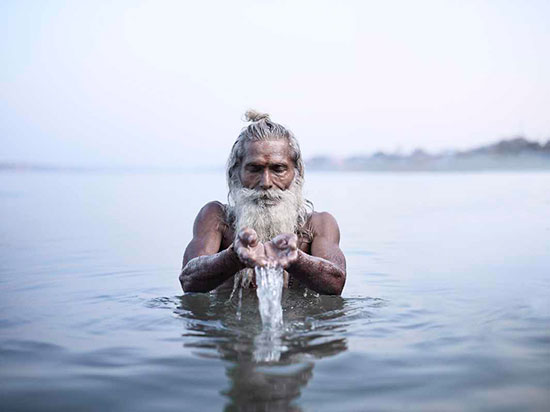
It was 3AM the next day. Maharishi Shantananda walked in with three of his disciples. He was handsome and majestic with flowing beard and soothing eyes. His face was an ocean of calmness. Eyes were deep pools of wisdom. His every step was majestic. He was tall and elegant. Vamadeva and Vishnu Sharman prostrated at his feet on the ground. Shantananda paused. Looked at them and asked without words, with his eyes which meant – “Who? Why?” He did not ask this verbally.
Vamadeva bowed his head down and said “Great Master, I seek your discipleship”. Shantananda’s eyes penetrated the young boy’s constitution. His eyes pierced through the visible into the invisible. A faint smile dawned on his elegant face – perhaps because of recognition from another life, perhaps because of what he saw in Vamadeva. Shantananda was a man of few words. He observed silence almost always except when it was extremely essential to speak.
Shantananda: What is your name?
Vamadeva: The ignorant restless walking corpse called Vamadeva, Guro
He asked “What are you seeking?”
Vamadeva: “The Ocean, Guro”.
Shantananda said “The path is right here within you. Why not walk?”
Vamadeva replied “Ignorance, Guro. Need fire. Need light. Need guidance to enter the journey, Guro”.
Shantananda “What is the destination?” (Where do you want to reach?)
Vamadeva: “The non-perceivable and the unknowable, Guro”.
Shantananda “Where shall you walk from?”
Vamadeva: “From the darkness of ignorance inherent in the terrestrial mind, illusory knowable, identifications, bindings. Illusory pleasures as well as sundry delusions, Guro, into the stillness and bliss of absolute and unchangeable and unknowable truth”.
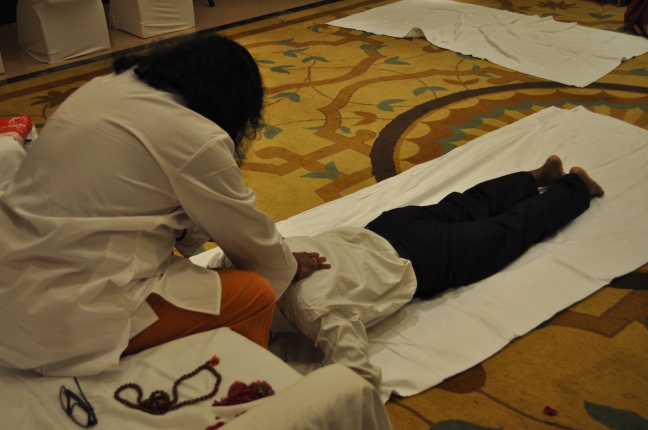
When the seeking ends, man becomes FREE.
Shantananda smiled and said “Come with me.” Vamadeva won his test and was accepted! The eight year old truly surprised his father. He looked in awe as to how his son acquired all this knowledge without formally learning anything from anyone so far! On one side, he was deeply impressed by his son’s stature at such a young age without any formal education. On the other hand, he feared he will never understand his son. Vishnu Sharman did not understand the conversation. He guessed a little and as a result, a deep fear dawned in him. A deep premonition. A kind of conviction and associated fear that he is perhaps losing Vamadeva forever. Is this the beginning of a path of renunciation for Vamadeva? He is seeking silence. Will he leave everything and take the plunge into the anonymity of the saffron dress? As a regular father, he wished his son to have good education, marry a good girl, have children, settle down and have a regular life like anybody else. But, he could perceive that his wishes are getting shattered right in front of his own eyes.
Shantananda never spoke to Vishnu Sharman even though he acknowledged his presence. There was no discussion on where he is taking Vamadeva, or how long he is expected to stay with him for the sake of education, or any other thing. There was no conversation at all. As Vamadeva walked away with Shantananda with just a glance and a nod towards his father, he sat under the Banyan tree and cried. So many unanswered questions rocked his mind. The most predominant were, “When will I see him again? And “Will I ever see him again?” Then, “What will I tell his mother?” He wept uncontrollably. Then he walked to the ghat and looked at the footprints with water on the steps, that of his son, Maharishi and others that disappeared into the wilderness of the city. He sat down and wept bitterly. Then he removed his clothes and plunged into the freezing, yet warm arms of mother Ganga. He immersed himself and his sorrows in her bosom. He took many dips. When he returned back to the shore, he felt better. He was calmer. He walked towards the temple of Lord Viswanath. He wanted to remove the rest of his emotions at the feet of Lord Shiva. Earthly emotions and relationships are almost always heavy and binding.
Nothing affected Vamadeva. He had just found his path, the reason for this incarnation. He was happy. He was excited. His Guru’s feet were the only reality for him. There was nowhere else to look. Nothing else to see either. Vamadeva walked with his Guru and his fellow students to his abode, not so far away from the ghats.

The Gurukul
Shantananda’s abode was disciplined, neat and clean. A medium sized house with big verandas on all four sides. At the time Vamadeva joined, he already had 8 disciples of different ages. Vamadeva became the 9th disciple. Mostly, the disciples slept in a row on the Veranda on the front side of the house. There was an open court yard at the front portion of the house. Between the gate and the house, the open court yard was paved with cow dung. Shantananda’s household consisted of himself, his wife and one son, a few cows and calves. He treated his son and his disciples alike. He treated the animals the same way too. Some local house helps came in the morning from their homes and assisted Shantananda’s wife Rukmini Devi in her house hold chores. But, mostly, it was the students who helped the major chunk of work including tending the cows, washing and cleaning clothes ad the ashram floor etc. They took turns to do the household chores. Shantananda insisted on practicing the silent lung breathing to increase the concentration of his disciples. When a set of students are immersed in the practice, the others used to do all the work. The next day or a couple of days, the rest will practice and the others will take over the duties of the household. This went on beautifully without any hindrance, without any reminders or even compulsion of any kind. There was perfect symmetry and synchronicity in the ashram of Shantananda.
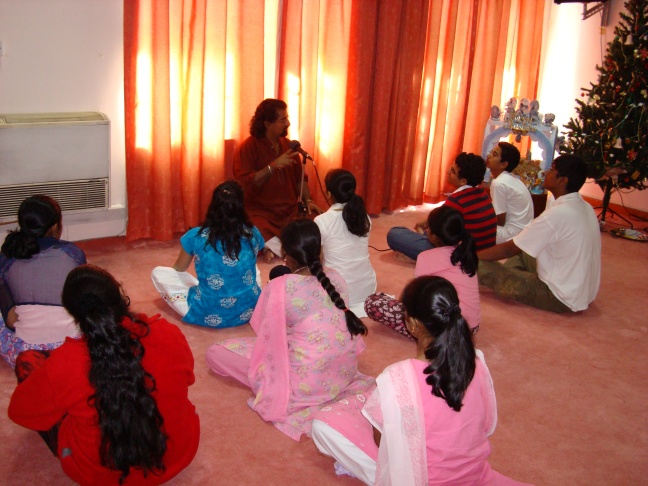
Every student did more or less everything. Tending cows and calves, taking them to grazing grounds and back, cleaning the yard and the house, washing clothes, helping kitchen, attending to Guru’s needs, attending to lectures, which was very random as mostly the Guru spoke through Gautama, his assistant and principal disciple.
Gautama was one of the more senior disciples. He was always very close to his Guru, attending to the gurus needs and the rest of the time, helping the guru’s wife in household chores. He also found time to orient the students with the key teachings of the master. His daas bhaav (total surrender and servitude) was so amazing and spontaneously became a living example of how a disciple should be to all the other students. It was interesting for Vamadeva to witness the humility and surrender of Gautama to his guru. Shantananda was a man of few words. He spoke very little. Gautama was one disciple who read the silence of his Gurudeva and acted on it. It was indeed a feast to watch how Gautama translate Gurus silence into deep and appropriate action without a word being uttered between the Guru and the disciple. The unspoken commands gave strength to Gautama to serve the Guru and his mission unfailingly. And it was perfect synchronicity. Shantananda’s silence was his strength. He taught his students mostly through silence than his words.
Everyone closely observed and then imitated Shantananda. Shantananda’s key teaching was silence and witness hood. He was always calm and unshakeable. No events or activity reached or touched his unshakeable silence. His presence itself was powerful. His daily routine included a trip to the ghats in the early hours of the morning as well as his time with his dhuni (the ever burning pyre that burns samskaaras and empties the cup of terrestrial identifications from the causal layer). In both these, his disciples participated. Shantananda’s son Mukunda was about three years older than Vamadeva. He was a very quiet and silent boy, with lots of humility and love towards everyone. Shantananda never discriminated between him and his disciples.
Shantananda had a small farm a few miles away from his abode. His attendants ploughed, sowed and reaped the harvest. Yet, Shantananda and disciples used to visit the farms a few times a week and work there. During the non harvest season, they took the cows and calves to the farm and allowed them to graze the whole day. Even though the Shantananda household used milk, they never kept the calves away from the cows. They only milked the excess after the calves drank to their fill. They always treated their animals with respect and love. Everyone lived together in perfect harmony.
Whenever the junior students like Vamadeva had doubts, they preferred to speak to Gautama. Shantananda did not spend much time with his students every day except during the ghat visits and fire ceremony.
Gautama was the mouth or the communication aspect of the silent Shantananda. Whatever Shantananda wanted to convey to his students, more often than not, he conveyed through Gautama.
Some Teachings
BAD KARMA
Gautama explained about bad karma based on an incident of one student betraying another on a small issue, and another incident of a village boy eloping with the wife of a neighbour leaving behind his wife and children. Shantananda prohibited the villagers from chasing the eloped couple and asked them to have patience. He was against all kinds of violence. He told the elders to allow them to have their chosen experiences even though it amounts to betrayal and hence it is against dharma. He said that once they are contended, they would return back. He told them to accept them like before, when they return back, because every incident has its karmic provocation and repercussion. All causes and effects are accounted for. Those who sow must reap. Allow karma to play out completely and reap the fruits of it as well. No external interference was appropriate.
Gautama said “Betrayal, cheating, stealing and such acts that create pain in the other should be avoided at all times. Betrayal is bad karma. Very very bad karma for the one who performs it and also the ones who supports it. It will haunt the one who performs it beyond lifetimes and similar experiences will disturb him time and again. Those who betray others will be betrayed much more. Same goes for victimization and character assassination. It is equal to assassination. Be aware. Never engage or support any of that. Lead your life as cordially as you could. Always tell truth, convey your mind without prejudices and live a clean life. Extreme guilt will haunt those who betray and cheat others. You may win some initial success, but you will lose your conscience, which is close to your soul. What is the use of winning the world by losing your soul? Eternal damnation will befall those who cheat, steal, betray and character assassinate others.”
He continued “Every cause has its effect. Every effect has its cause. This is unavoidable. The only thing we humans can do is to avoid acts of emotions, cruelty and in-sensitiveness. Avoid bad company. Always walk with elevated friends or at least those who are good at heart and benevolent by nature. Never be lured by spiritual powers or its demonstrations and resort to practices of dark nature to acquire them. This will affect you through life times. Always stay with the light path of our gurus and tradition. Help ever and hurt never. Never harm any being, let alone another human and never harm any saintly people through thoughts, words or action. You will never come out of its implication for hundreds of lifetimes. Bad causes will give bad effects. This is the major cause of all the sorrows of the world today. Insensitive actions – resulting in bad results.”
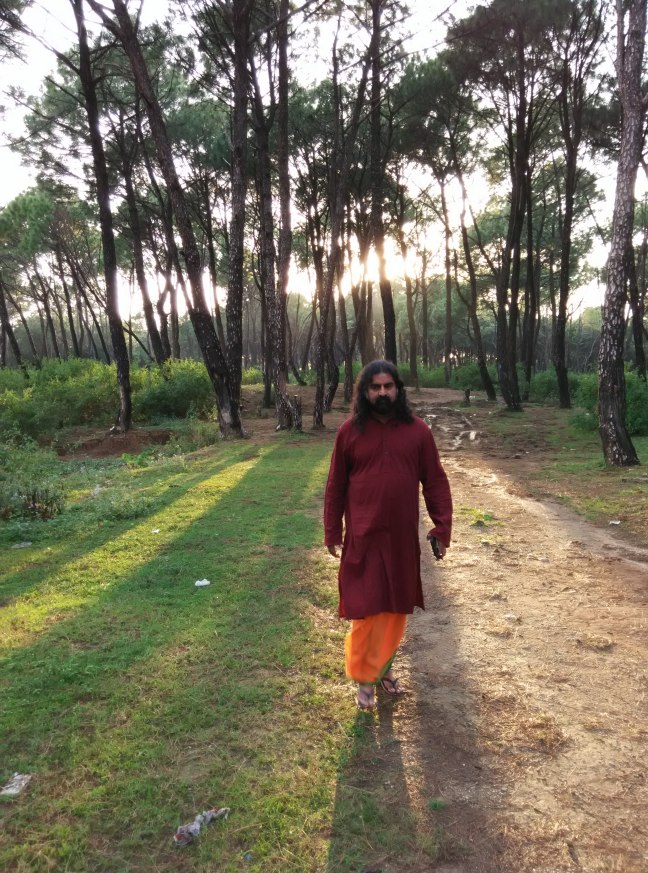
Possessiveness
An eagle was flying with a piece of meat clasped in its beak. He was in a hurry to take it to a safe location and eat peacefully. The meat was a bit larger than he could easily swallow on its way. Suddenly a school of crows started chasing the eagle. They flew with him and started attacking him. The eagle was helpless. He could not retaliate because he had this piece of meat between its beaks. The eagle did not realize for a long time, why the crows were attacking him. Finally, he realized that the crows were after the meat between its beak and not him. For some time he was reluctant to let go of the hard-earned meat. Then wisdom dawned with the intense suffering due to the attack of crows. Finally, he dropped the meat. Immediately, the crows left him and followed the piece of meat.
We all are like this eagle. We always refuse to drop the cause of our suffering and suffer eternally, often unconsciously and unknowingly. We work hard and earn our possessions suitable for our body, or mind or intellect. When we have those possessions, irrespective of whether they are material possessions or siddhis of spiritual nature, crows of the society starts chasing and hunting us. They come to take our hard earned possessions from us. We refuse to let it go because we believe they are legitimately ours. Neither us nor the crows understand the fact that these possessions are temporary and truly never ours or theirs. Everything passes hands sooner or later. But, we do our best to defend our possessions. In the bargain, we may get hurt. Finally, when we become helpless, we will reluctantly let it go. Otherwise, death will detach us completely from our worldly possessions. The more our possessions are, the more we will be attacked by the world. Lesser the possessions, more free is the life. Human beings hold on to their possessions and attract many such crows. When he lets his possessions go from his body, mind and intellect level, the world of crows stops bothering him. Avadhootas are walking examples of this level of non-possessive detachment.

COWS
On another day, while attending to the cows of the ashram, Gautama said “Our gurudeva says cows are sacred. The vedic wisdom never gave so much importance to any other animal except cows, even though it is rooted in ahimsa and respected all beings.”. Cows are considered as celestial beings. Do you know why? Students nodded their head in the negative sense. Trees consume carbon dioxide and releases oxygen which is beneficial for human existence. Similarly, cow is the only animal in the planet earth that has the capacity to take the negative energies of the society and releases only positive material. Cow in the society absorbs all the negativity of the society in a subtle level, stores it in her body and releases only good things like Milk, Dung and Urine – all of which nourishes life. They are all medicines as per Ayurveda. They are all used in our ceremonies and worships as well as farms and for organic cultivation of crops. The dung of a cow is also antiseptic. The dung of a cow eating pure stuff will have no odor. We spread it on our yard and on the floor to make it antiseptic. A cow’s meat should not be eaten because in subtle level, it contains all the toxins of the world which it absorbs every moment from the society. They are subtle beings and never engage in conflicts and fights. They absorb, store and give out only pure stuff. This is why a cow can be compared to a tree. A tree takes in used and polluted air and releases pure air which is good for our lungs. This is also why we are always sitting under the trees during satsangs. The pure air is refreshing and rejuvenating us. It is making our minds sharp and receptive. This helps us absorb more wisdom. The ancient sages used the dung of no other animal on earth except that of cows for the purpose of safeguarding themselves from bacteria and also as fire wood when dried. Its sacredness is its antiseptic quality. It can even heal wounds and injuries. A cow’s entire body is useful.
Our scriptures say that the entire body of the cow is the abode of many deities. Each deity has a functional purpose. This purpose is fulfilled through the body of the cow. It includes purification from gross to the ultimate subtle. Cow stores all negative subtle that she takes it in her body and destroys it at death. Thus the world is kept purified. Those who respect cows, are spontaneously sattwic in nature. We drink its milk. Hence, the cow is like our mother. We respect our mother. We respect the cows as our mother. Who can kill one’s own mother? Our predecessors, saints and sages constantly asked us to stay away from “himsa” of any kind. Himsa is Violence. Violence disturbs the vibratory level; both inside and outside of us. Violence in thoughts, words, and actions bind us to emotions and emotions lead us to further karmas. Karma has its root in unfulfilled desires combined with emotions which reinforces an operating character and constitution. So, a true sadhak (Seeker/Practitioner) should be aware of such traps of the path of liberation and stay clear at all times. We should not harm any beings of any species. Be compassionate and kind always. Never be selfish and upset anyone’s life. Life is the bed where you experience your karma over time. Keep your bed always tidy and clean.
FEAR
Fear destroys like fire. Fear is one of the formidable enemies in the path of liberation. Religions and possessive masters sometimes use fear to control their subjects which eventually affect themselves and their path adversely. In the path of liberation, before one sets himself to the conquest of his mind, he should conquer all his fears. Guru is the epitome of fearlessness and our leading light. We dissolve our fears in the consciousness of our Guru and lead a life of total emptiness and lightness. We have no reason to fear when we have unshakable faith in our Guru. Guru takes care of us every step. Faith destroys fear like water extinguishes fire. Faith is the most reliable water that destroys the flames of our fears. Awareness is the permanent way to tackle our fears.
In other words, the best way to conquer one’s fears is to face them and burn them in the fire of awareness. A rope feels like a snake in darkness to an ignorant mind and corresponding fears happen; but when he gets the light of awareness, the fear disappears. Likewise, most fears are related to darkness, death or unknown. They have no value in the daylight of awareness. Fear is the trap. World uses fear to bind people. This is wrong. When we delve deeper and deeper into our inner silence, all the stored fears will begin to surface. Watch and let go. Watch and let go. They have to escape through the conscious mind. Do not panic nor meddle with them. They are to be released gracefully. Fear is ignorance. It’s remedy is awareness. Your guru is protecting you, watching over you. All fears are illusions. Let go of your illusions and you will be established in the absolute truth.
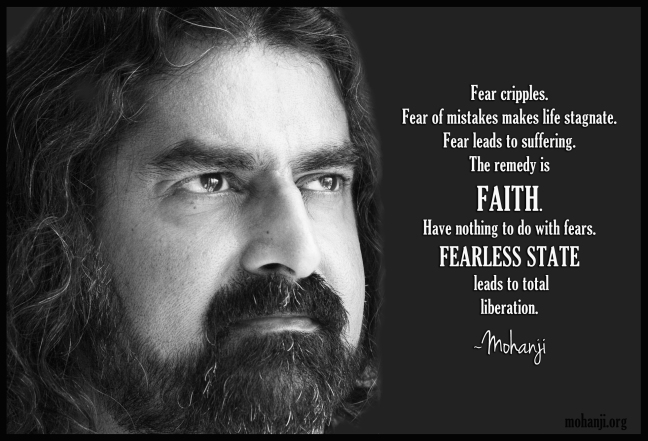
FIRE
Be aware that we are essentially the fire. The fire of creation that rested in the belly of the Sun became the Galaxy. The fire of will in the consciousness of the supreme Para Brahma manifested as the universe. The fire of your mother’s womb created you. The fire in your stomach sustains you. Existence is connected to fire. Fire is the only element that burns everything and never gets contaminated. It just leaves behind ash which is beyond flavour and design. The flames of fire only go up and never down. Hence, it is considered as the chosen carrier of offerings to all deities. It is always pure. It is always sacred. This is why our tradition keeps fire as our closest ally and fastest friend. We offer all our impressions and afflictions to the sacred fire. All our sankalpas and all our samskaaras are offered to the fire every day. Fire takes it on and releases us from its bad effects each day, yet it never gets contaminated by it. We worship Sun as the source of this platform called galaxy where life could thrive. We worship earth because she gave us the platform for our gratifications. We keep our bodies sacred and lust free because our only plan and aim of life is liberation. When we burn all our identifications and identities along with the stored impressions in the causal layer, we dissolve into the supreme Parabrahman. When we stop existing, only the supreme unsullied consciousness exists. Thus, we nullify ourselves.
Guru Shantananda
Our guru is an avadhoota. He is a great yogi. He came accomplished. Those who come fully accomplished can be considered as avataric births. They chose their births consciously while most of us chose our incarnations out of the need to fulfill the unfulfilled desires from our past incarnations. They have taken birth on dharmic basis to preserve dharmic causes. They abide dharma and their life itself is their biggest teaching. Those who come accomplished have nothing to achieve in this incarnation. They have only to deliver over time. They reveal themselves accordingly, as per the necessity and need. They do not display anything off which are unnecessary. They will never pretend nor will they expect anything from the world. They are totally detached from the samsara or the mundane existence yet will perform as per the demand of the incarnation and time. Most teachers are only acharyas. They are teachers. They have only acquired knowledge. The problem with acquired spiritual prowess is that, the power achieved through the mantras and practices have to be maintained through abstinence and rigorous practices an are difficult to maintain. They need to perform sincere practices on a consistent basis while abstaining from many lures of earth to keep what they earned or else will soon lose them. Some people observe strict celibacy. Some stay away from people. Some immerse themselves in severe practices. But the ones who come accomplished will walk and talk like ordinary men as they have nothing to do with the names, titles and vain glories or fame of the world. Such ascetics can never be compared with the acharyas. They strictly follow the divine will, in divine order and will never deviate an inch even if it costs their life. Their only interest is the establishment or re-establishment of sanatana dharma, the basic ground rules for harmonious existence. They have neither excesses nor demands. They expect nothing from anyone and none can do them any favour. They accept alms and bless the giver with abundance of spiritual bliss – they never beg nor they ask. They accept what comes to them spontaneously. Even small acts of kindness are deeply appreciated and nurtured.
Love is their food and offering. Fire is their ally. Silence is the bed on which they exist. Consciousness is AUM. There is nothing apart from them. So, friends, do not be confused between an accomplished master who has no interest to prove anything with an acquired saint who is eager to display what he has earned through books or practices. People who do not understand the inherent silence will not connect with these established saints who often look like nothing. Restless minds will leave them. The restless mind wander towards acquired teachers who display their earned prowess. Such seekers easily get trapped in activity which maintains the inner noise for a lifetime and sometimes beyond. So, even a spiritual enthusiast may take a long time to find his path, and even if he has found it, to recognize and marry it totally. An accomplished master like our guru Shantananda is full and complete. A pot filled with water never makes a sound. The noise happens only when the pot is half filled with water. It shakes and spills. So, be full pots and never compromise ever. There is nothing to prove in the external world. But you have to stay rooted in your inner world and this needs alert attention. Inner silence is your highest treasure and greatest blessing. And the association of an established master will spontaneously and effortlessly remove the age old karmic blockages and set you firmly in the direction of dissolution. So, never confuse between inherent siddhis (powers) and acquired siddhis. Inherent always stays and acquired can vanish any time.
As an example, Gautama narrated the story of another monk in the monk’s own words to a question as to how he acquired enlightenment at such a young age?
“I served the master in his house so I could observe him closely. And day and night I stayed looking at the master. He never looked at me so much. I sat on the ground and stared as the master went ahead with his work. Initially, my mind was restless. And I saw the master restless and often irritant too. I still kept doing the same practice. Master asked me nothing. I asked the master nothing. Slowly, I started feeling some emptiness inside me. Some things were leaving me. Perhaps I was merging with the master’s consciousness. What left me was my restlessness. Mind started to settle down. When I looked at the master, he also seemed pretty relaxed and settled down. No restlessness manifested in him. I continued. My inner silence became deeper and deeper. A kind of ecstasy started occupying the space. When I looked at the master, I found him ecstatic with uncontrollable joy. When I asked a man sitting next to me why the master is so happy, he asked me “Do you see happiness? I see anger and restlessness”. I decided to follow my own awareness which was the best thing to do. Truth was delivered to each according to his state of mind and capacity. Emptiness increases the capacity. We must be true to ourselves. We must trust our own experience. Ever since, I asked no opinions about my guru to anybody. My inner silence made me immobile. I started sitting at the same place in deep silence with the absence of mind from morning till evening and even through night sometimes. I never bothered about food or water. Often, they became a hindrance to my state of beingness. I understood that I have no other realms to conquer. I have attained the highest Everest of consciousness. I waited for Guru’s command. He never looked at me. He still played his role as always and different people saw his different flavors and thought they knew him. He played this illusion and existed as long as it takes. I felt complete, yet there was no “I” to feel that completeness. I asked nothing from my Guru. I never even asked him if he is my Guru. I just watched, watched and watched. I realized that i am watching myself when I am watching him. He is my SELF. He is my soul manifested in another form. I understood the core of existence. I understood that I have no existence apart from the universe. “I” died. Master called me one morning. He put his hand on my head and said “I have emptied you. You have become me. Now go into the world and be a beacon of light unto the darkness of ignorance. Be like a tree that gives shade to the woodcutter and the nursing mother alike. You have no separation from me. We are essentially one. I gave you emptiness, which made you complete. Now I give you freedom. Be free.”
Govinda’s story
Govinda was a classmate of Vamadeva. Same age and size. They were close friends right from the beginning. They bathed in the river together and slept in the same mattress. They even had a bit of resemblance to the extent that some thought they were twins. Govinda was a few months older than Vamadeva. But, he behaved as if he was the elder brother which Vamadeva accepted and allowed.
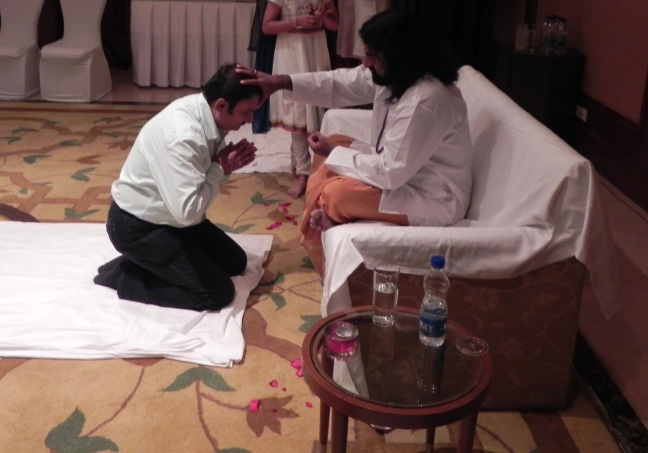
When they grew up and both moved to their late teenage years, Govinda started developing love interests while Vamadeva fell in love with isolation and silence. At every opportunity, Vamadeva would withdraw his mind from outside materials and would plunge it into the inner pool of consciousness, while Govinda would be busy chatting up with his girlfriend who was the daughter of a shopkeeper not so far from the Guru’s ashram at Varanasi. Many times, he tried to bring Vamadeva to his path of pleasures in vain.
Vamadeva had no interest and he was getting deeply settled in the pool of inner silence and making his mind float on it like a log of wood, unattached to anything. Slowly but steadily, as his dependency on the outside world reduced, his mind was getting dissolved into the pool of silence. His mind matter became lesser day by day and finally, it totally dissolved in the pool. The technique of swimming in the inner pool of silence was delivered by his guru Shantananda in silence. One day, Shantananda nodded to Vamadeva to come to him in his room. When he entered his room, Shantananda was sitting on the floor on a rug in lotus posture with his eyes closed. He stood in front of him until he opened his eyes. It took a good half an hour. He nodded Vamadeva to sit facing him. When he settled down in lotus posture, Shantananda looked into the eyes of Vamadeva. He was probably measuring the depth of the pool of silence. His eyes penetrated through both his eyes into the inner ocean. Vamadeva sat mesmerised. Shantananda plunged into the ocean of silence that was waiting to be explored inside his disciple Vamadeva. The waves of the ocean of silence roared and rolled in silence at the steady stare of Shantananda. He was activating something. He was delivering as well as collecting and removing the remnants of sound from the pool. Vamadeva felt as if he is floating, whirling uncontrollably and dissolving. He dissolved. He had no awareness of his body or what happened. Total stillness! Unbound joy of stillness! No person, no personality, no world outside. Only when there is a personality, there is a world outside. We witness the world according to our personality. Everything dissolved. Only silence existed. The sound of the ocean was silence. When Vamadeva came back to terrestrial awareness, it was well past midnight. His guru had left the room. He sat there much longer, until daybreak just being in silence without the push of thoughts in total and complete bliss. He knew that he had arrived. His guru has given him the greatest gift. He had arrived. The consciousness that he has been searching for within, had LANDED! Gratefulness welled as salt water in his eyes. It started flowing onto his cheeks. When he heard the sound of guru and his fellow disciples leaving for bathing in the ghat, he also got up to accompany them.
Govinda could not understand the sudden change in his friend neither did Vamadeva explain anything. His lack of interest for almost all worldly things came as a big time confusion for Govinda. He tried his best to make him sane. He even introduced some of the prettiest girls of the neighborhood to Vamadeva and took him to places of pleasures. Nothing worked. Vamadeva remained as aloof as ever, but never denied his company for Govinda’s pursuits. Vamadeva was more like an inevitable shadow for Govinda – inevitable yet, non-interfering.
The key to Govinda’s charm was his ability to predict future. It was partially skill and partially intuition. But, it always worked. Starting from his girlfriend who later became his wife to even the old and toothless women who would check with him if there was marriage in their cards; all were enchanted by his prowess. It was Gautama who initiated Govinda into astrology as per the instruction of Shantananda. The guru’s assessment was accurate, as always. He had known that Govinda will lead a terrestrial existence immersed in his personal glories and accolades. What he gave to Vamadeva was exactly what he came there for. Every disciple always got exactly what they deserved.
Govinda’s journey was colourful, but not always very smooth until his marriage. The shopkeeper father-in-law of Govinda never really liked him. His talkative nature and display of power to predict did not go so well with him. He believed that Govinda was an upstart and would eventually abandon his daughter for other women. In those days, two or three wives were a status symbol. He understood that Govinda may walk that path to show off because he ate, lived and bathed on applause. Hence, at one point in time, Govinda had to elope with his girlfriend and get married at a temple in the next village. Vamadeva was his companion in this adventure too. Even though silent and preferring isolation, Vamadeva was never afraid. Likewise, all the display of romance of Govinda never created any ripple of desire in the still consciousness of Vamadeva. Finally, when he came back, the helpless father in law was forced to accept his flamboyant son-in-law. That was the beginning of Govinda’s settlement in the city of Varanasi as an established soothsayer visited by the rich and the famous as well as the poverty ridden classes of the society. He was a good man with a good heart. He helped selflessly. Eventually, he became rich and popular and lived happily with his wife and children.

Govinda always cared for Vamadeva even though the latter preferred isolation and silence. Later on in his life, whenever he could catch hold of Vamadeva, he would bring him home and get him to give lectures on philosophy to an audience he would gather effortlessly. But, more often than not, Vamadeva would recognize his hidden agenda of meeting up with a girl or forcing a matrimony and would escape from the place. Often, Govinda never told Vamadeva what to expect and invited him to his house in the pretext that his wife has been inquiring about him or that he has not seen Govinda’s children for a long time. Vamadeva loved children and he could not deny such invites. When he would arrive there, there would be lots of people waiting to see him or attend his satsang. He would immediately take a U turn and disappear or if Govinda’s grip was firm, would escape whenever he could. After a few years, as Vamadeva wandered away from Varanasi, they did not meet for a long time. They did meet one time before Vamadeva left his body at the age of 49.
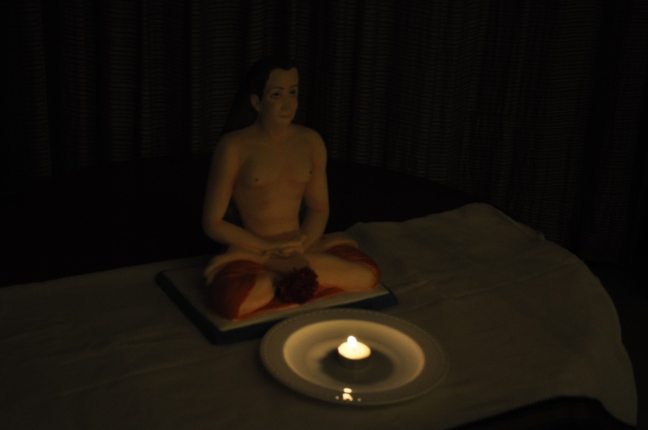
The Farewell
After 14 years in the presence and guidance of Shantananda, it was time for Vamadeva to leave. Govinda had left the school before he got married. Vamadeva stayed on bathing in the pool of silence of his guru and the tradition. He also nurtured new disciples in the absence of Gautama. Unlike Gautama, he was a man of silence. Hence the students liked Gautama’s classes much more than Vamadeva’s. Vamadeva was almost like his guru – always engaged in unshakable silence.
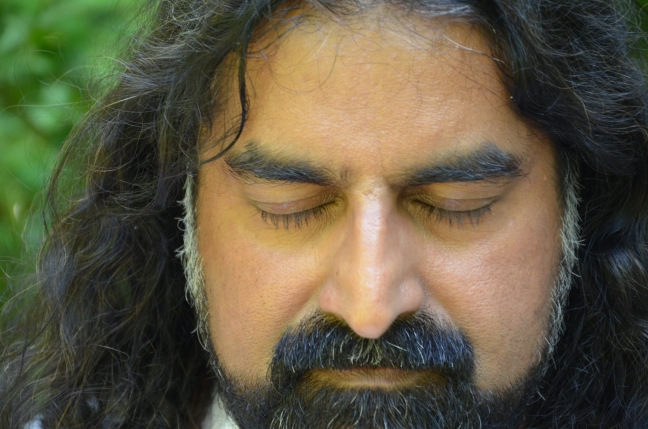
It was the day of departure. Vamadeva felt no emotions. The world that he was deeply involved in was within him. There was nothing outside that he considered as his own. When the old maid asked for a cloth, he gave his only spare cloth to her. Why did he have to worry? The heat was inside and he was always basking in the inner heat. How could the outside cold bother him?
Shantananda’s words were very few, deep and pregnant. He said in his deep and matter-of–fact tone. “Never give into pretentious images. Stay true to your true image which is formless. Do not display yourself or your stature easily to people. If you do, it will only enhance their expectations over you. It will not enhance their inner silence. Reveal yourself to those who are ripe and ready to dissolve. Then, they would need no display to know who you are. Walk the path inside. There is nothing outside to conquer. You have already earned your throne. The throne is eternal. You will always be watched and protected. You need not to care for anything. You need nothing because you have become everything. You have nothing to do with the pretentious world. You have nothing to do with the worldly possessions. You have to visit your parents one last time, serve them for a year before you start your journey, thus completing the dharma of a son. You will not stay in one place for more than three days. You will not develop attachment towards anything. You will have followers and not disciples. Even though you are a Raja yogi who is established in silence, you will be known as a Jnana yogi. In your next incarnation, you will be a complete Raja rishi. But, do not worry about any of these titles, name or fame which are all earthly lures and bindings. Be always aware of who you are and stay true to your true image.”
“From now on, you will be known as Atmananda Chaitanya and will be recognised as an Avadhoota.”
Shantananda took his vessel filled with sacred water from Ganga, took some in his hand and sprinkled on Atmananda’s head. He took two flowers, did some silent chant and gave it in his hand and sought Guru Dakshina (offering to Guru). Atmananda took a pomegranate out from his cloth bag and put it at the feet of his guru. He prostrated full length at his lotus feet. The Guru accepted the offering of his disciple; put both hands on his head and said “Be blessed. Be a blessing. Be useful and live the life of purpose until you leave this body at the age of 49. You will again meet me in sookshma (subtle) before you leave the earth. When you see me, you will know that it is time for you to leave. Prepare yourself and leave within two days after. Go now. Do not look back. You have nothing left here to take. Whatever you need for your life ahead, you already have. You are self- sufficient. YOU ARE FREE.” SELF SUFFICIENT… SELF SUFFICIENT…. ACCOMPLISHED… FULLY ACCOMPLISHED… FREE… FREE… FREEDOM… these words kept ringing in his empty inside for a long time, as he left his Guru’s abode with a heart brimming with gratitude. He sat for a while on the banks of Ganga. He looked at her for a long time. Slowly, stepped into the water and dipped himself many times. He drank lots of water. Wiping himself with his only towel, he wore the only cloth over the wet underwear and started walking towards the direction of his home and parents.
Gratitude
M
Disclaimer:
Atmananda is a fictional character created by Mohanji to explain the Tradition. Any resemblance to the living or dead is purely coincidental.
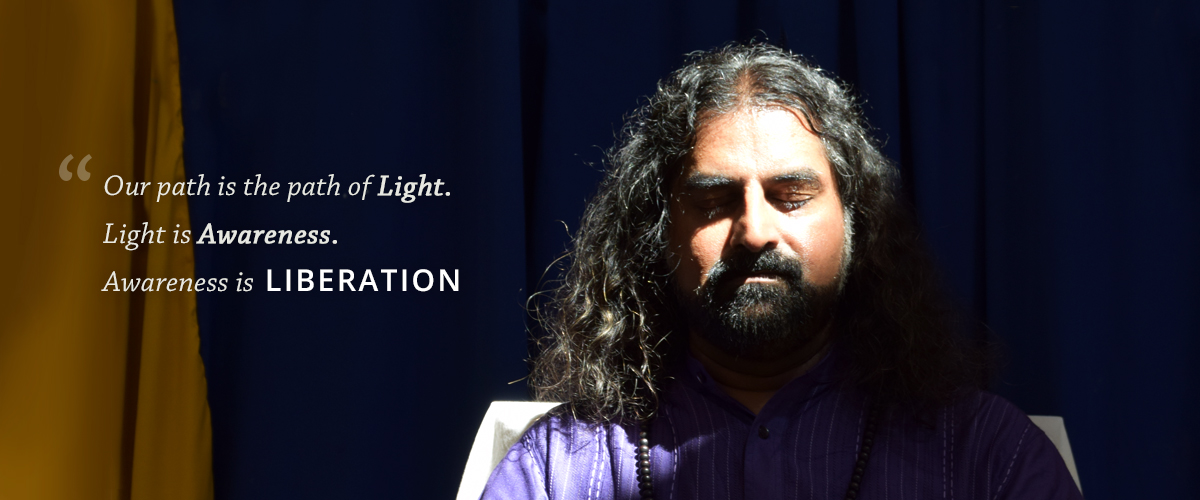







































































Absolutely enlightening gurudev…like all your posts…loved it a lot….
Lots of love…
LikeLike
Thank you so much for posting this enlightening satsang.
Jai Mohanji
LikeLike
Dear Mohanji,
My english is not good. I write in croatian and my husband translates it in english (his english is quite everage). Texts written in english, such as yours, I can’t read properly, so usually I wait for someone to translate it in croatian or serbian. If I can’t wait ’cause I’m eager to read it, I use google translator. The result is quite odd, as you can imagine. That’s how I red this one, the morning when it was published. That same morning I was helping my daughter Gita (10 years old) to wake up. One of the first things she told me when I entered her room was: „I was dreaming Mohanji“. „How was that, what was he like? “ – ask I. „He went in school class with me“ – says she. „Have he had beard“ – asks my husband jokingly. „No, he was a kid, such as I was“ – says Gita.
When Gita was three years old, she was dreaming Jesus, and he was the same age as her.
We experience Guru as somebody who is close to us in every way. He’s a person in which we have maximum trust. Guru is a mediator in our relation towards God. Everything which Guru says has its ‘weight’, its importance. Everything is important and nothing is accidental. And everything is addressed to us, each of us personally, because Guru is the mirror in which we reflecte ourselves. Reflection that we observe our Self through Guru represents the purest part of us. That pure part of us comes with some surplus, which doesn’t belon to Guru – it belongs to us. It’s a part that we didn’t release yet. That surplus represents a kind of ostensible distance between the Observer and that in which the Observer is mirroring himself.
Thank you for Presence, for every letter…
❤ ❤ ❤
Daniela
LikeLike
Tears of gratitude flows toward You, our beloved Master!
LikeLike
Thank you endlessly dearest Mohanji ❤
So enlightening and uplifting.
Love You
Kristina
LikeLike
My prostrations at the lotus feet of Guru Mohanji and the Guru parampara…
A true guru tests his disciple at every step in the journey. It is really difficult to stick with the path and the guru amidst temptations of every kind. While Vamadeva was interested in exploring the world within, Govinda succumbed to his senses and chose the external instead of internal. Vamadeva was given everything by his Master and eventually achieved the same stature. Absolute Faith in one’s guru is the key here.
Thank you for the blogpost Guruji…
Sashtang Dandwat _/\_
LikeLike